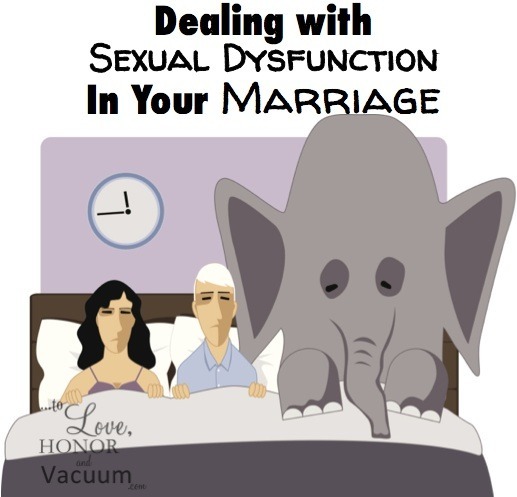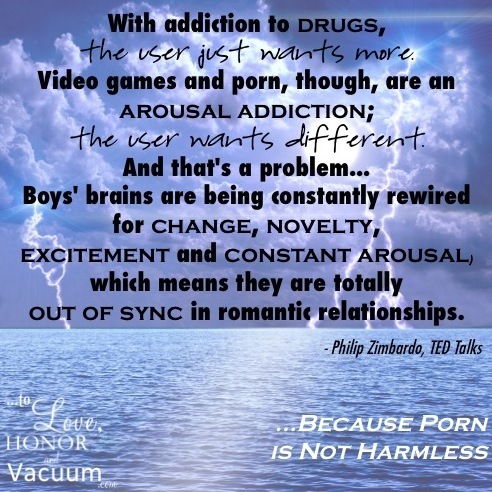Sheila Wray Gregoire's Blog, page 213
April 8, 2014
Sexual Dysfunction in Marriage: Dealing with Premature Ejaculation and Delayed Ejaculation

We’re in the middle of a 3-part series on sexual dysfunction in marriage, and today we’re going to tackle two thorny problems: premature ejaculation and delayed ejaculation.
In movies everything always works so well! He’s attracted to her, she’s attracted to him, and they fall into bed together and everything goes like clockwork. But what if the CLOCK is part of the problem? Either he seems like he’s playing “beat the clock”, and he ejaculates too quickly to make sex satisfying for her (or even really for him), or he the clock goes on–and on–and on. And it never seems to end!
Both these problems can make sex so stressful, and we’re never warned about that. We’re told sex is going to be this great thing that is natural, and easy, and it doesn’t take much to get it right. But what if, for you as a married couple, it does?
Yesterday we looked at some of the issues with erectile dysfunction, and while they’re related, premature ejaculation and delayed ejaculation are a little bit different. So let’s turn to those today.
 Sexual Dysfunction #1: Premature Ejaculation
Sexual Dysfunction #1: Premature EjaculationIn The Good Girl’s Guide to Great Sex, when I was writing about the problems in the bedroom that guys can have, I said that premature ejaculation is a really unfortunate term. Because how do we define it? The most basic definition is a husband who ejaculates before his wife has a chance to experience pleasure. But by that definition a guy who lasts fifteen minutes could be labelled having a problem if his wife lasts 30 minutes!
Other definitions have focused on the time it takes to reach orgasm. If it’s under two minutes, for instance, many people call that premature ejaculation. But most men can reach orgasm in that short an amount of time–if they’re not trying to wait for longer. So let’s for the sake of our discussion today define premature ejaculation as a man who reaches climax very early during intercourse–say in the first three minutes–and is unable to last any longer.
Who Has Premature Ejaculation?
Some men, from their first sexual encounter, have premature ejaculation. Indeed, it’s not that uncommon for a guy’s first encounter to be awfully short. Most men, after that initial episode, though, can start stretching out the encounters. Some men, however, never really are able to do that.
Men who have used porn, or who have masturbated extensively in the formative years, also often suffer from premature ejaculation. Not all cases of PE are caused by porn; but many porn users do report experiencing PE. Because they have trained the brain to respond to stimulus very quickly, rather than enjoying the experience of arousal, they have a difficult time lasting.
How Can We Cure PE?
If porn use is the root cause:
Like I said yesterday, quit the porn. If your husband is using porn, nothing else you do will help with the problem. You have to deal with the root first, and that means quitting porn and masturbation. Many men once they quit find that their brains reset and that the problem starts to fix itself.
If this is a longstanding problem not due to porn:
His body needs to learn to enjoy the sensation of arousal, and learn to delay ejaculation. Several techniques can help with this:
1. Play the Stop and Start Game
Start making love, but have him keep track of his arousal levels, on a scale of 1-10. Men who suffer from premature ejaculation often will go from a 6 to a 10 almost immediately. Once he reaches a 6, for instance, stop for a few minutes and have him stimulate you, and you alone. Then start again. Spend a lot of time on foreplay and not as much on intercourse as you start to use this technique, because starting and stopping intercourse can be a little frustrating for both of you. Once you’re able to drag out arousal using other kinds of stimulation, then begin introducing intercourse to the mix. A good idea is to do the stop-and-start by using different positions, so that you’re moving from one to the other and the stimulation isn’t regular.
It can take quite a bit of time to master this technique, and it doesn’t work for all. But it is a good thing to try, and many people just find it fun anyway (and it often is more satisfying for her if he’s spending more time making her feel good!)
2. Start and Stop Just with Stimulating Him
Similar to above, but this time just stimulate him. When he starts to get really aroused, stop and make him control his breathing. Do this once or twice a week and drag out the experience for longer each time.
3. Bring him to Orgasm Earlier in the Day
Sometimes men have an easier time lasting if they’ve already reached orgasm. So a “quickie” earlier in the day can help him last later.
4. Try an External Aid
I was contacted by The Prolong Climax Control Programme to get the word out about a treatment program that is discreet, inexpensive, and easy to use at home. It’s a device that is used on the penis 3 times a week to practice the start and stop technique. It’s available through internet ordering in Europe and Canada, and it can be used outside of intercourse. He can use it by himself, but I’d recommend using it with him during foreplay so as to help you feel more intimate and to not solidify any masturbation habits.
For those who have had a lot of trouble overcoming PE, the Prolong Climax Control has had great results for many couples from what I’ve seen.
Sexual Dysfunction #2: Delayed Ejaculation
If you’ve been making love for quite a while, and your husband just can’t seem to reach climax, or you often stop before he’s finished, then he could have delayed ejaculation. The causes of delayed ejaculation are quite similar to those of erectile dysfunction: there’s a problem in that not enough blood goes to the penis to make it hard enough, and then not enough arousal is present to achieve climax.
When Delayed Ejaculation Has Physical Causes
In some cases, like in erectile dysfunction, it could be a sign of physical issues: circulation problems; heart problems; obesity; diabetes; medication side effects; or excessive alcohol or tobacco use.
It’s always a good idea to have your husband see a doctor if this is a persistent problem to rule out any kind of health problem.
To help with delayed ejaculation, your husband needs to learn to concentrate on his own arousal, because he isn’t able to experience it as arousing enough to send him over the edge. So spend some time just touching him and pleasuring him without actual intercourse. Once he’s able to reach orgasm that way, get him very excited and only then start intercourse. Help him to close his eyes and just think about the sensation–not about anything else.
When Delayed Ejaculation Has Relationship Causes
If you have had your own share of sexual problems early in your marriage, your husband may feel guilty about enjoying sex, or may feel guilty about finishing. Sex is such a complex thing; a guy can start a marriage being completely excited about sex, but if he feels as if you don’t want it, or you feel uncomfortable or painful during sex, then that can affect his own ability to feel pleasure, even if you’ve overcome your own issues.
Allowing him to experience real pleasure and to concentrate on himself can jumpstart this and help you reboot.
Taking the initiative to start sex, too, can show him “I want this. This isn’t something I’m doing just for you.” That can change the dynamic and can help him feel free to enjoy it, and not guilty, thinking “she doesn’t really want to be doing this.” So take a deep breath, try to put the past behind you, and just enjoy being together. Show him that this is something you want, and that you do love being with him.
When Delayed Ejaculation is Caused by an Arousal Addiction–like Porn or Video Games
In other cases, though, it could be a problem not with the circulation system, or with the relationship, but with the arousal process in the brain.
Philip Zimbardo is a Ph.D. psychologist studying men, and in his TED Talk, The Demise of Guys (and I’m paraphrasing because he was talking really fast), he said this:
We’ve become so desensitized because of porn use that what is “normal” is no longer arousing, and people need more and weirder and different to achieve the same level of stimulation.
This is why erectile dysfunction and delayed ejaculation are often two sides of the same coin; with erectile dysfunction the man isn’t able to stay stimulated; with delayed ejaculation the man isn’t able to get stimulated enough. In both cases they need something MORE, and that more was fed to them by porn when the arousal mechanisms in the brain went haywire.
There’s a community of porn addicts on the internet at Your Brain on Porn, who have congregated together to abstain from porn and masturbation and “reset” their brains. It’s not a Christian site, and so I certainly don’t agree with everything that’s said, but there is a wealth of information there and it’s one of the best resources I’ve found on the internet to “see inside” what these guys go through. And what many of them say is that, when they’re using porn, they stop being able to get aroused naturally. Even when they’re having sex, they can’t climax unless they’re watching porn at the same time. Without the porn, they just aren’t aroused enough.
And here’s what’s interesting about what Zimbardo said: this effect is true not only with porn, but also with other arousal addictions. An addiction to video games, for instance, mimics the effects of porn on the brain, where the dopamine receptors are looking for more and more intense stimulation to reach the same high. And so video games become more graphic and more fast-paced. So even if the arousal addiction is not with pornography it can still affect the arousal processes in the brain.
How Do We Deal with Arousal Addictions?
If a guy is suffering from some sort of arousal addiction he just simply has to stop. The community at Your Brain on Porn finds that 90 days seems to be the amount of time it takes most people to rewire the arousal process.
So 90 days with no sex, no masturbation, no porn–and, if necessary, no video games.
Here’s what I like about that: it allows you to work on your relationship, and it allows the man to start experiencing life again instead of constantly feeling like he has to get back to the computer or video game.
Here’s what I don’t like about it: I don’t believe that true healing can come without a spiritual dimension to the problem. We have to acknowledge that we have sinned against God and against our spouse, and we have to ask God to fill us with His Spirit so that we can have self-control. I don’t think will power alone can fix most people; in fact, Romans 7 is all about Paul showing how will power isn’t enough. We need the Holy Spirit.
I think the 90 day reset if this is a real problem due to some sort of an addiction is a great idea. But I think that 90 days also needs to be filled with some prayer sessions, some counseling with a pastor and mentor, and some accountability. A guy has let some sort of an addiction steal his time and his focus away from his wife–and away from the rest of his life. Think about the emotional and mental energy he has wasted on other pursuits! This needs to be a time of real repentance if real change is going to be made.
 I know it sounds like I’m blaming it all on porn…
I know it sounds like I’m blaming it all on porn…And I absolutely know that in many cases sexual dysfunction is a physical issue, or it’s something that a guy only realized he suffered from once he was married, and there wasn’t an arousal addiction reason. In those cases, trying some of the techniques here can really help. But sexologists, urologists, and marriage counselors are seeing such a huge spike in sexual dysfunction in the last decade due mostly to porn (and to some extent video games). This can’t be ignored. So spread the word about the Top 10 Effects of Porn, and let’s help people to see that porn is not harmless, and that it really can wreck marriages–and your sex life!
The problem is similar to diabetes, really. We call all diabetes “diabetes”. But it’s really two completely different causes. One usually shows up in childhood, and there’s very little you can do about it. The other usually shows up in adulthood, and is highly correlated with lifestyle issues. We may call them the same thing, and they may have similar symptoms, but they’re really two very distinct causes, and that’s what’s going on here, too. Erectile dysfunction, premature ejaculation, and delayed ejaculation can all have physical causes, but they can also be caused by porn.
Today I dealt more with the porn side. Tomorrow we’re going to look at how to reboot your sex life when porn is NOT the cause of sexual dysfunction, but your husband has another cause for erectile dysfunction, premature ejaculation, or delayed ejaculation.


The post Sexual Dysfunction in Marriage: Dealing with Premature Ejaculation and Delayed Ejaculation appeared first on To Love, Honor and Vacuum.
Related posts:
When Erectile Dysfunction Hits Your Marriage
Dealing with Your Husband’s Porn Addiction
Wifey Wednesday: Reconciling Your Sexual Past with your Marriage





April 7, 2014
When Erectile Dysfunction Hits Your Marriage
 Every Monday I like to tackle a Reader Question, and this week’s is a common one: “my husband has ED” (erectile dysfunction).
Every Monday I like to tackle a Reader Question, and this week’s is a common one: “my husband has ED” (erectile dysfunction).
One reader writes:
Can you post about men with ED problems. My husband is 52 and I am 53. We have struggled in the area of sexual intimacy for most of our 27 yr marriage. I was always the one with low libido and my husband would react very negatively. I recently had my hormones checked and she gave me testosterone shots and it reversed our issues! He is struggling with ED. He is on blood pressure meds and thyroid pills. We are trying to talk thru the emotional aspects but it is very difficult.
I would say that’s the typical “face” of ED–a middle aged man, with some health problems, who suddenly finds that things aren’t working well. Yet increasingly it’s also younger men who have ED:
We’re in our twenties and we’ve been married for two years. My husband has never really been able to maintain an erection. Either it peters out before we really get started, or else he ejaculates too quickly. So now he’s almost given up trying, and he just plays video games until about 2 every morning. I want us to be intimate but I don’t know how to get around this.
This week I’d like to do a three-part series on erectile dysfunction and marriage, looking today at strategies to deal with impotence (ED), tomorrow at some of the “other” sexual problems we face, like premature ejaculation or delayed ejaculation, and then on Wednesday at how to keep a great sex life even when these things start to plague your marriage.
I have to admit from the outset, though, that I feel awfully sorry for men. Let’s face it: lots of times we women make love when “we’re not really in the mood”, and it works fine. We don’t always orgasm, and it doesn’t matter. But for a guy, if things don’t work perfectly, everything is thrown off. No wonder it’s so scary! And when things start to go wrong, there’s often a vicious cycle that starts, where they get so worried that it becomes a self-fulfilling prophecy, and then these husbands stop wanting sex altogether.
So let’s look at the three main causes of ED–one cause for ED in young men, and two causes for ED in older men–and then see some DOs and DON’Ts for the different scenarios.
If this isn’t an issue in your marriage, please read on anyway! I have a special word further down for wives who haven’t experienced this yet–because I think the key word is YET, and we need to be prepared!
 ED in Young Men
ED in Young MenIt used to be that the face of ED was Bob Dole in the Viagra commercial–an older man, who had been fine in his younger years, but now health problems and circulation problems had affected things.
Over the last decade, though, an epidemic of ED in young men has started. Here’s Dr. Oz–pretty much as mainstream as you can get–talking with a panel about how ED is now becoming a young man’s issue. And the reason? Porn.
A few weeks ago I wrote about the top 10 effects of porn, and one of the most common that they’re finding is that it causes sexual dysfunction, from ED to premature ejaculation to delayed ejaculation. It trains the brain to become aroused to an image, and not a person. And then when the image isn’t present, the person doesn’t provide enough stimulus. And so the arousal process doesn’t work.
This can be the case even if your husband is no longer using porn. For instance, I received this email:
My husband and I were both virgins when we got married. I was 22 and he was 23. He told me that he had used porn a lot as a teenager, but stopped when he was 20, and while he was still tempted, he really doesn’t look anymore. He and his best friend meet regularly to keep each other accountable & before we were married he gave me access to his computer and phone. But we had sex on our wedding night (it was really quick), and then once three days later, and now it’s been two months and he says he isn’t interested. Is this normal?
Yes, actually, it is normal–at least it’s normal for guys who have used porn a lot in their formative teenage years. Even if they’re not using porn anymore, often that arousal process is still messed up and needs to be retrained.
Porn is not the only cause of ED in young men–it could be that the two causes that I’ll list in a minute for older men apply better to your husband. But for most men under 40, porn is the root cause. So what do you?
1. Stop the porn
No ifs, ands, or buts. This will not get better if he is still using porn–it will only get worse. Project Know is a community of over 73,000 self-reported internet porn addicts who have made the decision to abstain from porn and masturbation, and they’ve produced some great research on their membership. 37% of these addicts reported experiencing erectile dysfunction, and only 27% reported having no sexual dysfunction at all–meaning that 73% of active porn users do report some sort of sexual dysfunction. The good news? Once you abstain for a few weeks, and your body and brain start to normalize, 60% report an improvement in sexual dysfunction–though they could still have problems, as our letter writer shows.
Nevertheless, it will not get better while the porn-and-masturbation cycle is still occurring.
These posts may prove helpful:
Top 10 Effects of Porn (show them to your husband if he’s skeptical)
4 Things You Must do if Your Husband Uses Porn
Are you a spouse or an enabler? (if your husband refuses to deal with his porn addiction)
2. Start the Recovery Process Focusing on Intimacy
Assuming the porn use is in the past, and your husband realizes that it was a major cause, you can now retrain the brain to become aroused by true intimacy, and not just anonymous images. Here’s a post on sexual recovery from a porn addiction, which includes some exercises on learning how to become vulnerable and truly naked with each other.
 I’d also highly recommend my book 31 Days to Great Sex (which is only $4.99 in the ebook version), which can walk you through, step by step, how to build real intimacy. Taken together, the book helps couples understand the difference between real intimacy and just sex, and helps couples move step by step towards achieving that.
I’d also highly recommend my book 31 Days to Great Sex (which is only $4.99 in the ebook version), which can walk you through, step by step, how to build real intimacy. Taken together, the book helps couples understand the difference between real intimacy and just sex, and helps couples move step by step towards achieving that.
Some DONTs for Younger Men with ED
Don’t recreate porn in your marriage, thinking this will solve it! The answer isn’t to be “hotter” than porn; it’s to retrain the brain to find real intimacy!
Don’t berate him for it. See porn as the enemy, not your husband.
Don’t rush things. It takes a while for recovery, and if you cling to each other, and give it time, you’ll come out stronger.
Some DOs in Marriages where Young Men have ED
Do work on your friendship with your husband–the more you can laugh together, the more you can take on anything!
Do work on creating more spiritual intimacy–like praying together or reading a chapter of the Bible before you go to bed. When you can become spiritually vulnerable with each other, this has a big impact on our intimacy, and often triggers a sexual response because of that intimacy.
Do encourage your husband to talk to someone else. You can’t be his accountability partner. You have to be his wife. Let him go to someone else to grill him. Don’t let that person be you.
ED in Older Men
When we think of ED, we do tend to think of older men.
 1. Dealing with the Physical Causes of Erectile Dysfunction
1. Dealing with the Physical Causes of Erectile DysfunctionHere’s what I reported in The Good Girl’s Guide to Great Sex:
According the the National Institute of Health, chronic erectile dysfunction affects 4% of men in their 50s, 17% of men in their 60s, and 47% of men over 75. Transient, or temporary, ED affects about 50% of men between 40 and 70. About 70% of chronic ED has physical roots, while the rest has emotional roots.
If your husband experiences ED once, don’t worry about it. It’s likely just temporary and it will pass. If it happens a few times, though, your husband needs to see a doctor. ED is often one of the first signs of circulatory issues, heart issues, and other health concerns. He may not like seeing a doctor, but think of ED as an early warning beacon. Don’t ignore it.
Sometimes ED can be caused by medication. If he’s on a number of medications and he starts experiencing ED, have the doctor or pharmacist take a look at all the drugs in combination and see if they’re all necessary, or if there may be a better combination that he could try.
ED can also be caused by obesity, smoking, or drinking too much alcohol. We may think we can “have a few drinks” to get us in the mood, but actually the opposite is far more common. Living a healthier lifestyle can often overcome many of the causes of ED.
2. Dealing with Emotional Causes of Erectile Dysfunction
A physical root to ED can often morph into an emotional cause for ED. Because a guy’s virility is so tied up in how he performs sexually, when he suddenly isn’t able to, even if it’s for a legitimate physical reason, it can cause him to become so insecure that he’s afraid to try again. Or when he does try, the stress that he’ll fail causes him to fail.
Other men have an emotional root to ED to begin with. It could be sexual issues–perhaps sexual abuse in the past, or dealing with homosexual feelings, or some issues from the family of origin. Or more commonly it could simply be stress. He starts to feel like he’s not man enough at work or in another high pressure situation, and this comes into the bedroom.
If your husband has ED, he’s going to feel sexually nervous. Many men, after a handful of times dealing with ED, swear off sex altogether. I’ve even received letters from women saying that their husbands have moved into another bedroom. Sometimes these same men are then caught masturbating. The men want release, but they’re scared of what may happen to their ego if they attempt intercourse. Or they become almost asexual, deciding that it’s safer psychologically to shut down that part of them.
Some DOs If Your Husband Has ED:
Do help your husband through stress he’s feeling–at work, with finances, with family. Help him talk through his feelings by being a sounding board. Do fun things with him.
Do treat ED as a minor inconvenience–not the end of the world. Sometimes things don’t work; let’s watch a movie instead, or just kiss for a while.
Do work on helping your husband stay healthy. Drink less alcohol, lose some weight, and quit smoking. These can help in the bedroom, too!
Do talk to your husband before this happens.
I want to emphasize that last one:
Even if your husband has not experienced ED yet: chances are one day he will. If you talk about it beforehand, it can make it easier. Look: we women are going to go through menopause, and EVERYBODY knows that. It’s talked about and joked about. We’ll get moody, we’ll get hot flashes, and our libidos may disappear–for a time. Because we’re expecting it, it isn’t as big a deal. Maybe we need to talk about ED in the same way! Most men will likely experience at least intermittent ED. If you talk about it now, before it happens, and acknowledge it openly, you can decrease the emotional punch that it may bring. Say that you expect it one day, and when it happens you’ll get through it together and develop strategies once you need to. If it’s something you’ve talked about, then it isn’t coming out of the blue, and it isn’t likely that he’ll be as self-conscious about it.
Some DONTs If Your Husband Has ED:
Don’t try to analyze this at the time. Let it go, and then talk about a few days later. Don’t push things in the bedroom, when it just happened.
Don’t baby him. Treat it matter-of-factly: this is something most men go through at some point, and we’ll get to the bottom of it. I have confidence in that–and in you.
Don’t Make This About You. Helen, from the The Unintimate Marriage, writes about her journey with a husband who has ED. And she has this advice for us: There is one temptation you will have through all of this: to make it about you. I’ve been there. You’re in the middle of a pretty hot and heavy make out session and you realize that it is causing very little reaction in him. All of a sudden you are off track too. You’re thinking, “Oh my goodness! He does think I’m fat!” or “I knew it, he does hate this haircut” top it off with a little, “Has he met someone else that he thinks is prettier than me?” Our insecurity comes on quickly, so I want you to really hear me when I tell you that this is not because of you! Don’t question how he feels about you at the time; treat it matter of factly, and move on to something else. You can talk about the root causes when it isn’t so emotional.
Where We’re Going From Here
Tomorrow we’re going to talk about how to handle two other areas of sexual dysfunction: premature ejaculation and delayed ejaculation. On Wednesday, we’ll look at how to keep a sex life alive even if sexual dysfunction means that intercourse itself isn’t always lengthy, possible, or very enjoyable.

The post When Erectile Dysfunction Hits Your Marriage appeared first on To Love, Honor and Vacuum.
Related posts:
Is Masturbation in Marriage Wrong?
Reader Question: Can a Marriage Survive on Quickies?
Wifey Wednesday: Magic Mike, Marriage, and Women’s Libido





April 5, 2014
Come Find Me!–and other Weekend Links
I love writing this blog everyday, but I want you all to know that there are lots of other places that you can keep in touch with me, too!
My Marriage Newsletter
This week my monthly marriage newsletter went out to 18,000 people! Every month I choose a different topic, and then I highlight posts from the archives that you may not have seen. Then I also highlight the marriage posts and Reader Questions that have been out this month. So if you want to make sure you don’t miss anything important–sign up!
This month the newsletter was on the Bible passages on marriage that often get misunderstood. The most click through post? My series on Do Not Deprive–what does 1 Corinthians 7:5 really mean?
Read the whole newsletter, (and you can subscribe using the button at the top left there), or subscribe to future ones now!
My Facebook Page
On Facebook is where I often post the cute graphics that I make that people share, plus ask Reader Questions to get input, ask ideas for future posts, and post really neat stuff from the archives. I’m trying to reach 25,000 fans by my birthday in May, so I’d love to have you join me if you haven’t already!
And I also post all my upcoming events there, so you’ll know if I’m coming to your area! So do join me.
My Daughter is Confused…
…About many things. She’s done some pretty heavy hitting youtube videos–on why she’s not dating in high school; what bugs her about youth group; and the difference between hot and beautiful.
But this one’s just for fun. Things that confuse her…
Guaranteed To Make You Tear Up…
Babies laid to rest in transformed wedding gowns. This is SUCH a beautiful thing. A team of seamstresses in Forth Worth collect old wedding dresses and make them into beautiful gowns to give to parents whose babies pass away in the NICU. My wedding dress is really dated, and I know my daughters won’t use it, so I’m thinking of sending it to this–it seems like a way to honour my son, who died when he was 29 days old. So thoughtful!
Are You Comfortable Being Naked with Your Husband?
I shared Hot, Holy and Humorous’ post on being naked on Facebook this week and it went crazy! I think this must be a sore spot for many women, so go read it!
Have a great weekend, everybody!
The post Come Find Me!–and other Weekend Links appeared first on To Love, Honor and Vacuum.
Related posts:
Weekend Links, Winners, and Other Cool Stuff!
Some Fun–and Interesting–Weekend Links
How I Messed Up–and Some Great Weekend Links!





April 4, 2014
Does God Make a Difference in Marriage Part 2
 Does God make a difference in your marriage?
Does God make a difference in your marriage?Last week I made some observations that often Christians act like God doesn’t really make a difference in our lives, and everything is ultimately up to us. We just don’t really have faith that God will actually move.
I see that in marriage, too, and I want to see how two different trends–though they may seem like they have nothing to do with each other–actually show that we have a long way to go with marriage.
1. Christians Divorce at the Same Rate as Non-Christians–Right?
You’ve heard that stat, haven’t you? In fact, it’s even worse than that. I’ve heard the stat that 50% of marriages end in divorce–but that it’s even higher in the Bible belt.
Do you believe it?
Chances are you do because Christians quote it all the time. We announce it from pews. We use it to fundraise for family organizations–Christian marriages need all the help they can get! We’re in dire straits, people!
Yet think it through logically. Do we believe that having God in your life should make a difference? Do we believe that God works in people’s lives? If we do, then how could it possibly be that our marriages are as bad as everyone else’s?
I started to wonder that recently and so I did an experiment. I looked through my church directory to see how many were divorced. It was closer to 10%. Then I wondered–maybe that’s skewed, because once people divorce they stop going to church? So I thought back on the couples I knew in university. I wrote out a long list of all my university friends who had gotten married. And of all of them (we knew each other from the campus Christian group), only 2 had been divorced–a rate of about 5%.
I read a study recently that said that in marriages where couples pray together daily the divorce rate is more like 2%. I believe that. It makes sense to me. And I’ve read critiques of that study that found that our divorce rate was just as high because they really didn’t define “Christian”. Practically everyone claims to be a Christian, and so that’s pretty meaningless. We want to flesh out what the divorce rate is among those who honestly believe and try to live out their faith. I want to write a post looking at all the accurate studies, but I haven’t done that yet. I’ve actually been talking to a major magazine about writing it, and that’s why I’m not linking to studies here. I want to make sure they’re accurate first and do my homework.
But the main question I have is:
why is it that Christians were so quick to believe that stat that God doesn’t make a difference?
2. Does God Make a Difference in YOUR Marriage?
Maybe the reason we’re so quick to believe it is because in our own lives we still really struggle with marriage. It’s an area that has brought us a lot of hurt and grief over the years, and we haven’t felt the “victory” or the “oneness” or the “intimacy” we long for.
I have to tell you that the last few weeks I’ve been really burdened by the emails that get sent to me. I had to turn off the Messages feature on Facebook because I couldn’t keep up with them all. And I’ve got Reader Questions of the Week now scheduled through to the end of June! But I started to keep track everyday of all the problems I heard about–really, really big problems–and then at the end of the day I’d show them to my husband. And we’d pray over them and I’d let them go. It helped me to realize how I was beginning to be changed by what I do, and I’m praying more for strength to really make a difference.
But the simple fact is that many, many of you are really hurting, and my heart breaks for you. Many, many of you are wondering, if we’re Christians why does my husband play video games for 6 hours a day? Why can he not get over this porn addiction? Why do I have no patience for him? Why am I always so frustrated with him? Why can I not motivate myself to show him love anymore?
From speaking at marriage conferences and talking to couples and to counselors, I completely believe that God can make a difference in a marriage. If you run to Him and you’re humble and you’re open to correction about the things that you have done wrong, and not just open to God correcting your spouse, God can do amazing things.
Even if your spouse isn’t turning to God, God can still work in your marriage. It doesn’t mean your marriage will always be saved; but He can work.
Yet often I see couples where both claim Christ, and where both go to church, and where both would say that they believe, and yet they are getting nowhere.
I don’t believe the problem is that you don’t have God. I believe the problem is that God doesn’t have you. (Click to Tweet this quote)
God is not like a mechanic where you can take your broken marriage and He’ll fix it for you. He doesn’t work that way. He’s not a mechanic; He’s a potter who wants to mold you into something better. But He can’t mold something that is hard and brittle; He can only mold us when we’re pliable, when we are humble, when we are open to be molded.
God isn’t really interested in fixing your spouse nearly as much as He’s interested in having your heart. And if we are humble before Him, He can transform us, which can start to transform a marriage. If your spouse is also humble before Him, He is then free to do a beautiful and amazing work!
But we have to stop making excuses. We have to stop pointing fingers. And we have to do the work!
I’m really burdened by a relationship issue in my extended family, and it’s causing me to pray like I never have before. That’s the beauty of relationship issues; they drive us to God. My instinct is to get on the phone and try to force the issue and make it all better, but like Calm Healthy Sexy wrote in a post she linked up to Wifey Wednesday this week, we have to wait on God’s timing. She says:
The devotional book I’m reading, Jesus Calling by Sarah Young, reminded me this week to “stop trying to work things out before their times have come.” That idea really spoke to me; it made me realize that’s exactly what I’ve been trying to do. Even though I believe in God’s timing in my life, I haven’t been operating as if I believe in it at all. I’ve acted as if everything depends on me, as if I just need to keep charging ahead and things will fall into place exactly as I’ve planned. The only problem is, it’s not working.
We have to pray and then honestly walk in faith. We have to wrestle. We have to cry. And we have to believe.
Yesterday I took a day to fast and pray with a “blogging buddy” of mine from the other side of the continent. We prayed for each other all day and for ourselves and then at the end of the day we called each other and prayed on the phone together. We were both burdened by something similar and we needed God to lift that burden. But that meant also emptying ourselves and fighting for it. It meant giving God more of us, not just asking for more of Him.
If you believe in God, He should be making a difference in your marriage. If He’s not, the problem is likely not with God. It’s likely that He wants to bring you deeper, or bring your husband deeper. Of course you can do everything right and lean on God and your marriage may still not be saved, but even in that God wants you to lean and trust, because He does want to make a difference even in the brokenness. But maybe, instead of getting angry at our spouses and feeling defeated and feeling lost we need to throw ourselves more on God and get back to the only source that can bring real healing.
Do we believe God works, or not? I fear too often we really don’t, and then it becomes a self-fulfilling prophecy.
The post Does God Make a Difference in Marriage Part 2 appeared first on To Love, Honor and Vacuum.
Related posts:
Reader Question of the Week: How Has God Made a Difference in Your Marriage?
Wifey Wednesday: Carelessness is not an Option





April 3, 2014
Bragging on Your Beloved: How Gratitude Can Transform a Marriage
 I used to believe in “venting.”
I used to believe in “venting.”Blowing off steam.
Letting it all out.
My best friends were those who listened to all my marital ain’t-it-awfuls while nodding in agreement and adding sympathetic comments like, “No way!” and “That’s just terrible!”
I was certain that “talking it out” with girlfriends was the only thing keeping me from going off the deep end.
Not until I took a gratitude challenge did I realize three startling truths:
my marital problems weren’t the real reason I was always in crisis.
my sharing of wedded woes wasn’t helping anything.
my venting habit was what kept me forever teetering on the edge of despair.
Focus Causes “Baditude” to Expand
Let’s explore what I wish was merely a hypothetical scenario from the early years of my marriage:
Before leaving for work one day, my husband said something offhandedly that hit me the wrong way.* For the rest of the day, I couldn’t get his comment–let alone his tone of voice–out of my mind. It stayed on automatic replay; I analyzed it over and over. The more I pondered it, the more upset I became.
When I got together with girlfriends for lunch, I asked for their opinions. Together, we dissected the comment and the tone syllable-by-syllable. We explored all possible interpretations and discovered that not a one was positive. We all agreed: I had been wronged.
By the time my husband and I reunited that evening, I had invested 5+ hours mulling over a comment that took him 5 seconds to make.
Can you guess:
What kind of mood I was in?
What kind of greeting I gave him?
How I treated him the rest of the evening?
The answers, I’m embarrassed now to admit, are:
Lousy
Cold shoulder
Disrespectfully.
Worse yet, I felt completely justified in my behavior and believed he deserved every bit of it.
Why?
Because what I’d focused on all day had expanded in my mind until it was all I could see. I’d focused so much on that one comment that all I saw when I looked at my husband was negative.
Gratitude Causes Focus to Expand
When I started keeping a gratitude journal, I gave myself permission find just one thing per day to be grateful about in my marriage. Some days, even that one felt like a Herculean effort.
Fortunately, even as stubbornly as I clung to my “baditude,” the practice of gratitude began to do what thankfulness always does: it expanded my focus. I found myself writing down two and even three things I appreciated about Daniel without having to force myself; they just flowed out of my pen. Then, I started reaching for my gratitude journal throughout the day as new ideas popped to mind.
And if you’ve ever experienced this kind of transformation in your thinking, you know what happened next: the more gratitude I expressed, the more things I noticed to be grateful for.
And the more things I was grateful for, the less bugged I became by an offhanded comment. The less I “needed” to blow off steam. In fact, venting started to feel icky. I lost interest in competing for winner of “Woe is Me” Wife contests and started hanging around women who spoke highly of their husbands.
 Bragging On My Beloved
Bragging On My BelovedYou can get Cheri’s Bragging on My Beloved Journal here in my store. It’s only $2.99. Look and appreciate the positive in the one you love!
(*NOTE: In this example, I am referring to an ordinary, everyday misunderstanding that occurs between two loving but imperfect people. I am not discussing an instance of abuse, abandonment, addiction, or adultery.)
Cheri Gregory is a Certified Personality Trainer; contributor/co-author of a dozen books, including Wired That Way and 21 Ways to Connect With Your Kids (with Kathi Lipp); and frequent speaker for MOPS groups, women’s retreats, parent workshops, and educational seminars. She holds an M.A. in Leadership and is working on her PhD. Cheri has been “wife of my youth” to Daniel, a pastor, for over a quarter-of-a-century; they have two college-aged kids. She blogs about expectations, “baditude”, and hope at www.CheriGregory.com

The post Bragging on Your Beloved: How Gratitude Can Transform a Marriage appeared first on To Love, Honor and Vacuum.
Related posts:
Complaint Free Week Day 2: Attitude of Gratitude
Can God Really Transform a Marriage?





April 2, 2014
Wifey Wednesday: Supporting Your Adventure Loving Husband

It’s Wednesday, the day when we talk marriage! And today Renee Tougas is joining us to share her story about her adventure loving husband.
I met my husband twenty years ago. We met at a Christian campus organization camping trip. That should have been my first clue.
I always knew my husband liked the outdoors and physical activity. When I met him he biked, hiked, kayaked, rock climbed, and lifted weights. A lot of young men are into those things. They like the physical challenge, the “muscle building”, and the adventure.
It wasn’t Damien’s sense of adventure that attracted me to him or even his muscles though. It was his steady nature. I am a reactive personality type. I am expressive in both my highs, and my lows. My husband is the near opposite of me and I fell in love with his easy going nature.
I was nineteen years old. I had no idea what I was getting into.
 I was looking for a steady sort because though I was young I knew what I wanted in life. My dream was to be a wife and a mom. I wanted to stay home with my babies. I wanted home to be my first career and after that, well, I’d figure it out when the time came.
I was looking for a steady sort because though I was young I knew what I wanted in life. My dream was to be a wife and a mom. I wanted to stay home with my babies. I wanted home to be my first career and after that, well, I’d figure it out when the time came.
I was looking for a man. Call me old fashioned but I wanted someone who could provide and protect. I was frugal, and still am. I didn’t want much in the way of worldly goods but I wanted a solid, steady family life.
God gave me my husband to make those dreams come true. And to stretch me beyond those dreams in ways I could not have imagined.
As much as my husband was the steady I was seeking, he is also a visionary adventurer; not content to stay put or accept status quo. He questions and he quests. I knew a bit of this when we married, I have those tendencies myself. But I like to do my questioning from a place of relative comfort and security.
God knew what I needed. Someone to stretch me beyond the comfort and security of my carefully constructed world.
I connect with a lot of women through my blog FIMBY. I’m not a marriage expert but after seventeen years together I am happily married and still head-over-heals in-love. I guess that counts for something.
A blog reader, who was about to get married, asked me if I had any words of wisdom to share.
My advice went something like this: “Your life, your marriage, your spouse will probably surprise you in some way. Hold onto each other for dear life and be ready to change and grow.”
My own major growth spurt came a few years into our marriage. The early years of our marriage were very much about establishing home and family. Making a home in the various apartments we rented, making babies and taking care of them, learning how to be a good manager of our finances and my time. We bought a home, started homeschooling and I tended our backyard garden. I was living my dream.
And then my husband wanted to live his dream.
He has many dreams actually. He’s a dreamer. A steady provider yes, but a dreamer too. And there were things he wanted to do besides build a home and family. He wanted some adventure.
 Thus began the most significant growth curve of our married life – saying yes to my husband’s dreams. Saying yes to adventure. Saying yes to a lot of personal and marital growth that was at times physically painful and uncomfortable (like the first time backpacking!).
Thus began the most significant growth curve of our married life – saying yes to my husband’s dreams. Saying yes to adventure. Saying yes to a lot of personal and marital growth that was at times physically painful and uncomfortable (like the first time backpacking!).
Something funny happened.
This comfort-loving, routine-seeking homemaker became an adventurer herself. I fell in love with the things my husband wanted to do. Hiking, backpacking, cross-country running, and backcountry skiing. I started to welcome more spontaneity into my life, and let loose the grip I had on how things must be.
I learned a few things along the way that may help you support an adventure-loving husband also.
Be his best friend.
My husband wants to be with me. He choose me. He’s rather go hiking, skiing or any other activity with me than anyone else. What a gift.
We choose each other when we made our vows. We choose to throw our lots in together, come you-know-what or high water. And trust me, I’ve experienced some “high water” moments in our adventures. But the fact remains my husband would still rather do these things with emotionally expressive me over anyone else.
We have made a conscious choice not to go separate ways in our hobbies and pursuits, instead investing time in together activities so our we get to spend as much time with each other as possible.
 Just say yes. Not everyone is married to a dreaming, adventure loving husband. You might be the adventurer in your marriage, or adventurous in areas that your husband is not.
Just say yes. Not everyone is married to a dreaming, adventure loving husband. You might be the adventurer in your marriage, or adventurous in areas that your husband is not.
I think what our spouses want from us, regardless of which one leads the adventures, is that we say “yes”. Can we say yes every single time? Probably not. My husband has so many ideas. Too many ideas. We can’t do all the ideas, someone has to help sift through and think through them all. My “down-to-earth” managerial skills come in handy there.
But I need to say yes more than I say no.
Saying yes to our adventurous and visionary husbands communicates “I believe in you”.
It communicates respect. My husband thrives, he is fulfilled and driven to provide for our family, when he feels I respect and believe in him.
This summer I am thru-hiking the Appalachian Trail with my best friend and the three children our love brought into existence. We are embarking on an adventure that was just a dream one time for my questing husband but because I said Yes, is now a reality.
Are you married to a visionary adventurer?
Maybe your husband is an outdoors adventurer. And he would love nothing more than to spend days in the wilderness with you, hiking and camping.
Or maybe your husband is an adventurer of a different sort. An entrepreneur or perhaps involved in ministry, blazing a trail into territory that is unfamiliar and uncomfortable for you.
Regardless of which kind of adventurer he is, I bet he wants, more than anything, to have you join him. To be his adventurer-in-arms. To have you say “yes”, just like you did those years ago when he proposed.
If your family loves adventures of the outdoor kind and would love inspiration, ideas, and encouragement for how to make more of that happen in your life, follow our adventure this summer by subscribing to our video series Beyond our Boundaries: A Family Adventure on the Appalachian Trail. Never heard of the Appalachian Trail? You can read all about it and details of our family adventure here.
How do you support your adventure-loving husband? Let me know in the comments!
Renee Tougas is a hiker and homemaker; a mother and wife; a writer and photographer. Fresh and honest, Renee’s blog FIMBY is the story of interest-led learning, creative and adventurous family living.

Now it’s your turn! Have any marriage thoughts for us today? Link up below by putting the URL of a MARRIAGE post into the linky. And be sure to link back here so other people can read all these great marriage articles! It’s a great way to build traffic for your blog, and I often highlight some posts on Facebook and Twitter, so link up below!

31 Days to Great Sex is here (only $4.99!) It's the best $5 you'll ever spend on your marriage!
Learn to talk more, flirt more, and even explore more! You'll work on how to connect emotionally, spiritually, AND physically.
Find out more
April 1, 2014
Top 10 March Posts and Products
 It’s Top 10 Tuesday, and today I thought I’d post the top trending things on this site from March–both the top posts and the top products!
It’s Top 10 Tuesday, and today I thought I’d post the top trending things on this site from March–both the top posts and the top products!
Today I’m going to start with the top 5 posts that were published in March, and then the top 5 older posts (the big ones from this blog). If you read one of these posts and like it, I’d so appreciate you sharing them on Facebook or Pinterest! They’re good ones, and I’d love for even more people to see them.
Top 5 Posts from March
February was the biggest month I had ever had here on To Love, Honor and Vacuum–until March came along. I had almost three quarters of a million people on this blog last month! And here’s what they were reading:
 1. Top 10 Effects of Porn on Your Marriage and Sex Life. I’m so glad this got a lot of traction, because I’m totally PASSIONATE about this post. I want more people to realize that Porn is Not Harmless! I’ve got a great new graphic up to share at the bottom of the post, so head on over and pin it!
1. Top 10 Effects of Porn on Your Marriage and Sex Life. I’m so glad this got a lot of traction, because I’m totally PASSIONATE about this post. I want more people to realize that Porn is Not Harmless! I’ve got a great new graphic up to share at the bottom of the post, so head on over and pin it!
2. Screwtape Writes About an Exhausted Mom. Thanks to Kelsey from Organizing Life with Littles for this awesome guest post, warning us to keep our eyes open for attacks.
3. Top 10 Ways to Initiate Sex. Yeah, this one was kinda fun!
4. Sexual Options Beyond Intercourse. Great guest post from Julie from Intimacy in Marriage. Thank you!
5. Marriage in Africa vs. Marriage in North America. Thanks to Ngina for this great look at her native Kenya vs. her new home in America. Some awesome insights we can all learn from!
Top 5 Posts from Earlier in the Blog
Often the same posts tend to be my biggest traffic generators, though this month we have a Valentine’s Day addition. If you haven’t read them, do click through. These are the posts I’m most well-known for!
 1. Why I Didn’t Rebel. My 19-year-old shares why she thinks she didn’t rebel. She’s not claiming that if you do these things your kids are guaranteed NOT to rebel; she’s trying to dispel the myth that all teens WILL rebel. What she wrote brought tears to my eyes.
1. Why I Didn’t Rebel. My 19-year-old shares why she thinks she didn’t rebel. She’s not claiming that if you do these things your kids are guaranteed NOT to rebel; she’s trying to dispel the myth that all teens WILL rebel. What she wrote brought tears to my eyes.
2. The 50 Best Bible Verses to Memorize. Make it a habit to learn one verse a week for a year.
3. 7 Thoughts That Will Change Your Marriage. I just signed a contract with Waterbrook for a new book based on this blog post! It should be out September 2015.
4. 16 Ways to Flirt with Your Husband. Choose 1-2 to start doing today!
5. Why Doesn’t My Husband Want to Make Love? It’s one of the most common searches that lands people here at this blog.
So there you go–my top 10 posts. My Bible verses post has ALWAYS been my top post–until February when Why I Didn’t Rebel beat it. And it beat it again!
And I do so appreciate it when you all share stuff. The only way I get known better is when people choose to share my posts, so I do want to say thank you, especially after this great month. It’s very humbling, and it’s so neat to see what God is doing–especially with my daughters’ words.
Now I want to share with you another Top 10:
The Top 10 Products Purchased at My Store
 1. 31 Days to Great Sex (ebook edition) It’s such a fun one to work through with your husband! I’ve sold over 10,000 copies now.
1. 31 Days to Great Sex (ebook edition) It’s such a fun one to work through with your husband! I’ve sold over 10,000 copies now.
2. 50 Best Bible Verses to Memorize Printables (available in both ESV and NKJV). Here’s the list of the best Bible Verses to memorize that the cards are based on.
3. 50 Best Bible Verses to Memorize Printed Out and Mailed
4. Deck of Dares–want to spice up your marriage? Here’s a really fun way!
5. How Big is Your Umbrella. When you’re going through rough times, it’s my short book of the things you yell at God when life is tough, and what He whispers back. Based on a weekend retreat that I often give. You can also get it in ebook format!
6. 31 Days to Great Sex (paperback)
7. The Sex Savvy Wife ebook. Written by J from Hot, Holy and Humorous, it’s everything you ever wanted to know about sex to make it work great!
8. The Talk(s). Want to keep a great relationship with your kids so that they make good decisions about the opposite sex? Here’s an awesome book that helps you do just that!
9. Crafting an Effective Signature Talk. Did you know that I have a whole line of products to help Christian speakers grow their ministry? Here’s my most popular download on how to create a great talk.
10. The Good Girl’s Guide to Great Sex. I don’t sell a lot of these because quite frankly it’s cheaper to buy them on Amazon when the postage isn’t as much (I have to mail from Canada). But some people do like autographed copies! 
So there you go! If you haven’t stopped by my store in a while, go check it out! I’ve got lots there to help you build your marriage–and your speaking ministry.
The post Top 10 March Posts and Products appeared first on To Love, Honor and Vacuum.
Related posts:
Did You Miss These Posts? Top 10 Posts for May!
Top Posts for November
Top Ten Posts for July





March 31, 2014
Reader Question: My Husband Married Me Because I was the “Good Girl”
Ever feel like “there’s no passion in my marriage”?
Every Monday I like to answer a Reader Question, and today’s is from a woman who said her husband married her because she was “the good girl”–not because he was passionately in love with her. She writes,
I am in my late 20s and have been married for a year and a half. We have been blessed with a beautiful baby who is 4 months old. I am grateful to God for all His blessings, I have married a good man of faith.
In recent weeks, it has become clear that I was chosen to be his wife because I would make a good wife and be the right ‘helper’ in bringing my husband closer to God, but not because he was madly in love with me or because he was deeply attracted to me–ever. My husband says he made a conscious choice not to be driven by sex, but to choose someone for the more lasting values that marriage has to offer.
On some level, I have known this but I assumed it was perpetuated by my low self esteem. Our sex life makes me sad and frustrated; my desire to be physically intimate is much greater and deeper than his, and he doesn’t understand my perspective on marital sex and how important it is to me. Now it is abundantly clear that if he found me more attractive, he would be more driven to have sex with me. It would be less of an effort to initiate it with me. It would be more frequent, spontaneous.
It breaks my heart because I know for certain that I married someone who doesn’t adore me, doesn’t desire me deeply, but loves me for all the ‘right’ reasons. It hurts so much. We are Catholic and deeply believe in the sacrament of marriage and my question is: how do you come to terms with knowing you, as a wife and mother, were the sensible choice rather than one of passion and love? How do you find your happiness knowing that previous women my husband had sex with before marriage were more attractive to him than I am? How do I find peace as a wife and mother, without feelings of regret, resentment, disgust, anger and deep hurt towards my husband and myself? How do I overcome feeling like a second choice and feeling stuck?
I can feel the hurt in this letter. She had an image of she and her husband both being madly, passionately in love with each other, and she’s missing that. She feels like she’s second best.
So here are some thoughts that hopefully can help her change her perspective!
1. You Need a New Fairytale
Read some Jane Austen. Seriously.
Sense and Sensibility is the tale of two sisters: Elinor and Marianne. Elinor is all “sense”. She’s logical, she doesn’t let her emotions rule her life, she’s loyal, subdued, and steady. Marianne, on the other hand, is all “sensibility” (English 19th century speak for emotions). She falls hopelessly in love with a man named Willoughby who sweeps her off of her feet. They are both passion to the extreme.
Yet Willoughby turns out not to have very good moral character, and breaks Marianne’s heart.
She gets ill and almost dies (she is rescued by Colonel Brandon), and as she is recuperating, she starts to notice the Colonel, who has always been there, in the background, steady and secure, too. He is kind. He is loving. He is moral. He is upright. And in the end she chooses him.
He is not the Passion of her Life. He is Better.
Too many of us live with this idea that true love is “feelings”–that butterfly feeling when he is near; the way your heart skips a beat when he touches your hand; the undeniable attraction and obsession you feel for him. That is love, right?
 What Austen was trying to show in her novel was that basing a marriage on these feelings often leads to disaster. It is far better to look around you and find someone who is WORTHY of your love. Someone who will be steady. That may not create these breathless moments, but it does create a lifetime of peaceful and quiet happiness. And perhaps we should value peaceful and quiet happiness more, and breathless moments less?
What Austen was trying to show in her novel was that basing a marriage on these feelings often leads to disaster. It is far better to look around you and find someone who is WORTHY of your love. Someone who will be steady. That may not create these breathless moments, but it does create a lifetime of peaceful and quiet happiness. And perhaps we should value peaceful and quiet happiness more, and breathless moments less?
Science says that Austen had a point. In Sacred Search, Gary Thomas’ book on how to find a mate, he debunks the whole “I need passion in a husband” myth pretty well using science. It turns out that breathless, heart-skipping-a-beat obsessive feelings last, on average, 18 months. That’s it. No matter how passionate they were, our chemical reactions to each other can’t sustain that in the long term. Eventually all these breathless feelings go by the wayside. And then what is left?
[image error]
March 28, 2014
Does God Make a Difference Part 1: Our Expectations
 Does God make a difference in our lives?
Does God make a difference in our lives?Every Friday I like to write a more personal reflection piece on the things I’ve been mulling over. I’ve written about a bunch of different things lately–why teenagers rebel, women getting burnt out from church, why we yell at our kids–and as all of this has been spinning around in my head, sort of like laundry in a washing machine, turning upside down and back and forth, I’ve started to see some common threads.
And one thing that occurred to me is this:
Deep down, we’re supremely scared that God doesn’t make a difference. Deep down, we’re supremely scared that we’re in this alone, and we have to make decisions alone, and all of this rests on our shoulders.
Let’s look at the church example and the teenage rebellion example for a moment to see what I mean.
Our Churches Give off the Message that They are Extremely Insecure
 In my article on women starting to say “no” to church activities, we had a great discussion in the comments about what sorts of activities really are vital to a church, and what sorts of activities are more like “make work” projects, that we do because churches have always done these things and there really is no way around it. But then I had a few emails that helped me see things in a different light. Jan Cox, an author friend of mine, asked this:
In my article on women starting to say “no” to church activities, we had a great discussion in the comments about what sorts of activities really are vital to a church, and what sorts of activities are more like “make work” projects, that we do because churches have always done these things and there really is no way around it. But then I had a few emails that helped me see things in a different light. Jan Cox, an author friend of mine, asked this:
Why is it that we need food at every Bible study? If I go to a Bible study at 7:30 at night or at 11:00 in the morning there’s always the expectation that there will be food. But when I’m at home I eat three meals a day. I don’t eat at 11:00 or 7:30. So why is it that we always have to make and bring food? Shouldn’t the Word of God be enough?
I think that’s an excellent question, and it gets maybe to the heart of the matter. Food is a wonderful thing, and community is often built around sharing a meal. But why do we bring food when food isn’t necessary?
Maybe it’s because we’re trying to make the activity more attractive, because we’re secretly afraid that if there’s not food, and there’s not a “fellowship” time, and there’s not something “fun”, that people won’t come.
It’s almost like an incentive.
Nowhere is this more apparent in the church than in youth groups, which are little microcosms of the wider church. Youth group is set up to attract kids and make them stay by making it FUN. We don’t want to overburden them with Bible studies. We want to give them lots of messages on how God loves them, and not quite so many on holiness. We want to do lots of flashy games! We want high energy, high power, high numbers!
But isn’t this really saying, “we’re afraid that kids won’t show up unless we make every week like a party”? (My 16-year-old just made a tongue-in-cheek video on the 5 Things She Hates about Youth Group, and I think you’d enjoy it, because it gets to this issue. We give a watered down message and a ton of games, and ultimately, is that effective? I know she’d appreciate it if you watched it and SHARED it!)
There’s a very fine balance between creating a great, nurturing community at a church and being so scared that people will leave that you have to make sure that there’s a ton of energy and activity.
We certainly need fun things at church, and we certainly need some food. But I think the wider point is still there: are we throwing these activities and doing these things to try to keep the ones we’ve roped through the doors in the doors, or are we really wanting to grow in Christ? Because sometimes we give the impression that it’s the former. Like the people get through the door, but then it’s our responsibility to make sure we don’t lose any (even though it was God the Father who went out and found the lost sheep). And we seem awfully scared that we’ll lose people if we don’t have the best worship music, the best pews, the right colour carpet, and the right food at coffee time. (Though I love the coffee bars at many churches!)
We Assume Teenagers Will Rebel
 Now let’s turn to the teenage rebellion issue. My 19-year-old’s post from last month on why she didn’t rebel has gone completely viral. It took all of us by surprise, and she’s done radio interviews and been offered internships and all kinds of things since that post came out. It’s kind of ironic, too, because she wrote it in about 15 minutes when she was bored at a university statistics class. So it’s not like we planned it or anything.
Now let’s turn to the teenage rebellion issue. My 19-year-old’s post from last month on why she didn’t rebel has gone completely viral. It took all of us by surprise, and she’s done radio interviews and been offered internships and all kinds of things since that post came out. It’s kind of ironic, too, because she wrote it in about 15 minutes when she was bored at a university statistics class. So it’s not like we planned it or anything.
But what she set out to argue was this:
Teenagers do not have to rebel. Too many parents treat rebellion as if it’s to be expected, and it’s absolutely not. Many teens won’t rebel, and we shouldn’t expect that they will.
I think that’s a perfectly valid thing to argue. But in the comments many people turned the argument on its head, as if she were arguing this:
If you do these things your kids are guaranteed NOT to rebel.
She wasn’t saying that at all, and I did think that she made it clear. But I’ve noticed a really funny phenomenon on this blog. Whenever I post about how to parent toddlers or how to discipline school-aged children, the comments all revolve around the techniques. But when I post about how to parent teenagers, the comments shift. Suddenly they’re all about, “ah, but you can do all of these things and kids can still turn out badly!” It’s like you’re not allowed to share “best practices” for how to parent teens in case we make people feel guilty.
I just sense that Becca’s first argument is still very much the underlying tone of how we approach parenting teens.
“There are no guarantees. Kids can, and often do, mess up. This has nothing to do with you, though.” Doesn’t this sound like we’re trying to give God an “out”? I believe in you, God, but if it’s not in your plan that my kids stay Christian, that’s okay. It’s not really a prayer of faith, is it?
I do agree that there are no guarantees, but it’s also a matter of emphasis. There are no guarantees that I won’t be hit by a car or get cancer tomorrow, either, but I’m operating on faith that God has me in His perfect plan. And so I don’t worry about those things. If they were to happen, I’d deal with it because God would carry me and He would be with me. But I’m not going to assume the worst right now because that isn’t biblical and it does nothing to help my life.
Yet are many of us walking on default, assuming the worst?
So let me ask you today: are you living out your Christian life as if you have faith that God is in control, knowing that you can hand things over to Him. If something bad happens, He’ll carry you, but you don’t focus on the bad. Do you assume that God will actually make a difference in your life?
Or do you assume that God will only make a difference if we work our hardest and do our best and spin those little legs as much as we can, because ultimately it all rests on us? And so it’s likely we’ll fail. It’s expected we’ll fail. And faith isn’t something we live out. We give lip service to it, but we don’t live it.
God should make a difference. If He doesn’t, what’s the point of all this? But God won’t make a difference until we start living by faith, knowing that He can do His own PR work (we don’t have to). He has the power to draw others to Himself (we don’t have to). He has the power to hold others in the palm of His hand (we don’t have to). He has a perfect plan for us and our loved ones (and we don’t have to worry about it, knowing that if we hit some major bumps in the road, He will then be there for us).
Does God makes a difference? Do you live like He does? If not, what will it take to get you there? Let’s talk in the comments!
Next week I’m going to talk about whether or not God makes a difference in our marriages. I want to explore the fact that in too many cases He doesn’t–and that’s because we’re not letting Him. I think secretly we’re scared that God WON’T make a difference, and so we crowd Him out and ignore what He says. And if you want to watch that video that my daughter did, here it is! (Or you can watch it full size on YouTube).
The post Does God Make a Difference Part 1: Our Expectations appeared first on To Love, Honor and Vacuum.
Related posts:
Parenting Is All About Expectations
The Curse of Low Expectations for Teens
Great Expectations? Do We Expect our Kids to Fail?





March 27, 2014
Teaching Kids to Cook: Spending Quality Time while Teaching Life Skills
 I’m a big believer in teaching life skills to kids. I think too many moms do too much for their kids, which ultimately does them a disservice. When they move out they don’t know how to fend for themselves, but they also grow up feeling a little entitled, since little is expected of them.
I’m a big believer in teaching life skills to kids. I think too many moms do too much for their kids, which ultimately does them a disservice. When they move out they don’t know how to fend for themselves, but they also grow up feeling a little entitled, since little is expected of them.When Jillian St. Clair asked if she could sponsor this post to share about her new resource, My Very Own Cookbook, I agreed, because cooking alongside my girls has been one of my most fun memories of their childhood!
I grew up with three sisters and a brother. The kitchen in our home was not very big, so not surprisingly we were not allowed to do much in it. When I got married I was not confident with my cooking skills even though I majored in Home Economics in high school.


My mother, aunt and grandmother cooked many delicious meals that I don’t know how to prepare. I don’t want the next generation to follow in my footsteps, so I’ve created My Very Own Cookbook for parents to share time with their children teaching them how to cook. It’s also a wonderful record of time shared with loving relatives who will help them become capable, self-confident adults.
There are many “grown-ups” who have no experience in preparing nutritious, healthy meals for themselves or their families.
Together, parents and young children can create memories of learning useful, cooking and management skills. Perhaps you were given many gifts/presents as a child but lack the training and confidence to care for a home, keep up with the laundry, and prepare delicious, healthy dishes or even how to set a table.
If You Didn’t Learn These Skills, It’s Not Your Fault!
None of these skills come naturally to any of us. We must count on others to help us learn them and this learning can begin as early as 4-years old. My grandchildren are 10, 8 and 4. When we’ve enjoyed family vacations, we’ve prepared recipes together. Sadly, many children don’t get to spend much time with their parents. This is something they especially crave when they are young. Time passes quickly; if we’re not careful, we may miss the chance to make an important impact in our children’s lives.
When we don’t cook from scratch, too, we tend to eat out more. Not only is that far less nutritious and far more expensive, but it also means that you lose the potential to really bond as a family the way families used to do around the dining room table.
Beware of Technology Undermining the Dinner Hour
Often when we’ve eaten in a fast food restaurant I see parents texting instead of sharing conversations with their children. My concern is that this pattern will go too far and when these children are pre-teens or teenagers, they will no longer want to spend much time talking with or listening to their parents. Cooking and eating together creates opportunities to share important daily events in our lives. Studies show children who share meals with their parents make better decisions and earn higher grades.
As parents, it’s our responsibility to expose our kids to everything we can that will help them succeed in all aspects of their lives. Good manners, respect for others, kindness, acceptance and patience are learned behaviors. Who else is best to teach these than the parents who love them? Setting up this kind of relationship early will benefit both the children and their parents. Knowing your children can care for themselves is a huge blessing!
The Best Gift of All from Teaching Kids to Cook: Quality Time With Your Kids
Research shows that working parents spend only 19 minutes a day of quality time caring for their kids. Perhaps you have heard this scripture verse before:
“Train a child in the way he should go, and when he is old he will not depart from it.” Proverbs 22:6.
The Food Network has featured many young children taking an interest in preparing recipes and even full meals. This early training will be very valuable to them as they mature into adulthood.
My daughters were 7 and 10 when I became a single mom. I was a stay at home mom until that time and when going back to work, the girls pitched in and helped take care of the laundry, their rooms and the home we lived in. Today, they have careers and homes of their own. Thankfully, they spend a great deal more than 19 minutes a day with their children.
As parents, we can help our children become adults by teaching them many things they’ll need to know so they can care for themselves when they leave home. Most parents with grown children remember and cherish the special times they’ve spent with their children. Teaching children how to be independent and self-sufficient is a precious gift.
My Very Own Cookbook is a blank recipe journal encouraging children to share time with their parents and other loved ones. Filling in the details of a recipe being prepared with help from loved ones will be a cherished gift and record of special times spent together with loved ones and a timeless record for their future children to enjoy.
Want to start teaching your children to cook? Download Jillian’s FREE ebook: 15 Recipes You Can Make with Your Kids–and get started today!

The post Teaching Kids to Cook: Spending Quality Time while Teaching Life Skills appeared first on To Love, Honor and Vacuum.
Related posts:
Standard of Living vs. Quality of Life
Teaching Your Kids Appropriate/Healthy Relationships with the Opposite Sex
Teaching Kids to Pray: The Five Finger Method












